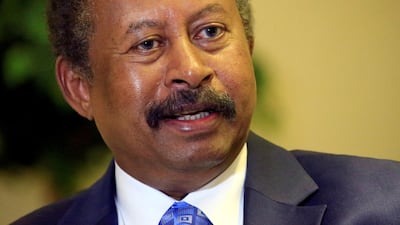US President Donald Trump vowed on Monday to remove Sudan from the state sponsor of terrorism list after Khartoum pays the victims of past terrorist attacks $335 million.
“New government of Sudan, which is making great progress, agreed to pay $335 million to US terror victims and families,” Mr Trump announced on Twitter.
“Once deposited, I will lift Sudan from the state sponsors of terrorism list.”
The money would compensate the families of victims from the 1998 Al Qaeda attacks on the US embassies in Kenya and Tanzania, and the terrorist group's 2000 attack on the USS Cole.
Sudan’s former government under Omar Al Bashir harboured Al Qaeda members complicit in the bombings.
Victims of the September 11 terrorist attacks have also filed lawsuits against Sudan.
The Sudanese military removed Al Bashir last year after months of popular protests against his decades-long rule, prompting calls for Washington to remove Khartoum from the blacklist.
The US first designated Sudan as a state sponsor of terrorism in 1993. The three other countries on the list are Iran, Syria and North Korea.
Sudan’s inclusion bars Khartoum from receiving foreign assistance as the country grapples with a democratic transition, the Covid-19 pandemic and a severe economic crisis.
Sudan's Prime Minister, Abdalla Hamdok. welcomed the US President's message.
"Today, as we approach the disposal of the heaviest legacy of the dictatorial regime, we affirm once again that the Sudanese people are a peace-loving people and have never been supportive of terrorism," Mr Hamdok wrote.
The Trump administration has also pushed Sudan to follow the lead of the UAE and Bahrain in normalising relations with Israel.
Former Sudanese Foreign Ministry spokesman Haider Badawi said in August that Khartoum was considering a peace agreement with Israel.
Khartoum immediately denied the claim and dismissed Mr Badawi from his post.
Mr Hamdok repeated his opposition to normalising relations with Israel as recently as last week.
He said his transitional government did not have the mandate to decide on such large foreign policy issues.
US Secretary of State Mike Pompeo visited Mr Hamdok in August to discuss a possible pact with Israel.
And Israeli Prime Minister Benjamin Netanyahu travelled to Uganda in February for talks with Sudanese Lt Gen Abdel Fattah Al Burhan, chairman of the military-civilian Sovereignty Council.
Shortly after that meeting, Sudan began allowing Israeli planes to fly in its airspace.


